« Chronique:Canon Fodder - Infinity & Beyond » : différence entre les versions
m Lunaramethyst a déplacé la page Canon Fodder - Infinity & Beyond vers Chronique:Canon Fodder - Infinity & Beyond : Remplacement de texte — « Canon Fodder - » par « Chronique:Canon Fodder - » |
mAucun résumé des modifications |
||
| Ligne 169 : | Ligne 169 : | ||
==New universe entries this week!== | ==New universe entries this week!== | ||
*'''[ | *'''[https://www.halowaypoint.com/en-us/universe/characters/iona Iona]''' | ||
Iona was a smart artificial intelligence created specifically for operational analysis by ONI. | Iona was a smart artificial intelligence created specifically for operational analysis by ONI. | ||
*'''[ | *'''[https://www.halowaypoint.com/en-us/universe/characters/blackbox Black-Box]''' | ||
Black-Box is a fourth-generation AI construct used to monitor affairs at the highest levels of human government for Serin Osman, head of ONI. | Black-Box is a fourth-generation AI construct used to monitor affairs at the highest levels of human government for Serin Osman, head of ONI. | ||
Dernière version du 24 juin 2021 à 00:26

BY GRIMBROTHER ONE - 9/11/2015
ISSUE 41
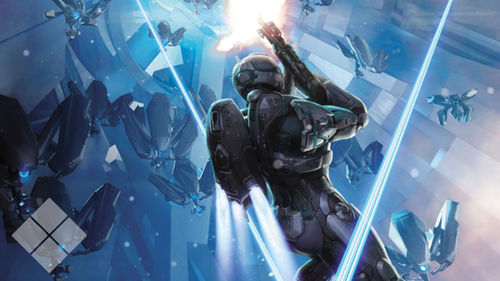
Welcome back, story-supporters! Last week we gave you your first details on the upcoming Halo novel from Joseph “Please do the Grunt voice” Staten, Halo: Shadow of Intent. This week we’ve got a smattering of lore-laden topics to touch on, starting off with a few words from current lead writer on the Halo: Escalation comic series, Duffy Boudreau. Many of you have been following Duffy’s work quite closely over the past few months, as he’s brought fans page after page of new Halo story goodness, featuring lore loaded with deep implications for the greater Halo narrative. Most recently, Duffy has been responsible for penning “The Absolute Record” story arc, which helps directly bridge the gap between the events of Halo 4: Spartan Ops and Halo 5: Guardians. I sat down with Duffy to ask about his role in creating new fiction, as well as how it feels to take on such a mantle of responsibility. Let’s get started, shall we?
Comic relief[modifier le wikicode]
GrimBrother One: Can you talk overall about how the experience has been writing for Halo? What has made the experience unique compared to other work you’ve done?
Duffy Boudreau: First off, working with 343 has been great. Any time I have a question about some crazy detail—let’s say the top speed of a Harvester or something—they’ll have an answer for me. It’s also been fun working with them on big-picture story stuff, figuring out where each potential story fits in the overall Halo saga, what the implications are going to be on future events in the universe.
The most unique aspect of Halo, for me, is the massive amount of diehard fans. It’s a writer’s dream to have such an involved audience and I love the fact that Halo fans are split into these hardcore factions about how they feel about certain characters or major events in Halo history. That’s an aspect of Halo that really gets me going creatively.
GRIM: You’re absolutely right on the “die-hard fans” point, that’s for sure! So speaking of connecting back to the big picture, you’ve worked on four different story arcs for Halo: Escalation now, “The Janus Key” and “The Absolute Record” in particular have a special place in the fiction as they are in essence direct continuations of the Halo 4: Spartan Ops storyline. What type of preparation did you do to prepare for these specific arcs?
DUFFY: I revisited Spartan Ops a bunch. And with any story research, you start with the foundational material and you put on your viewer’s hat and ask yourself — “Where do I want to see the story go from here?”— and — “What questions need to be answered for all this great stuff to be paid off?” You start making a list, then you’re rolling.
I also took a look back at some Forerunner history, to cover The Librarian’s involvement in the story. Even though she’s not physically present, she’s the one who set everything in motion, so her intentions are definitely affecting the main conflict.
GRIM: I think that fans certainly appreciate the commitment to investing in the established fiction. On the other side of the coin, we see Halo: Escalation not just looking back, but looking forward. In “The Glass Horizon,” we got to experience the origin story of Spartan-IV Holly Tanaka, who players will become even more familiar with throughout Halo 5: Guardians. Can you speak to the process of helping introduce a character like that, helping to give a foundation for them within an entirely different medium?
DUFFY: It’s a big responsibility to introduce a character like Tanaka, but that’s the most exciting thing. Knowing fans of hers are going to go back and discover it—and it better be good, you know? Part of “The Glass Horizon” that’s interesting to me is that Tanaka is such a stoic and reserved person that she’s not going to be telling this story to many people, so it’s kind of like a secret history. Sure, in Part One she tells her colleagues part of the story — but that’s for a very specific reason, she’s trying to spur them to action. But she’s not the type of person I see telling that same story at the bar or something.
The medium part of the question is a good one, but honestly, I don’t really think of it being any different. There are some logistical differences, but I try to tell the same stories in the comics that we’d all want to see on the screen. Comics are a primarily visual medium, and the best of them—my favorites anyway—are the ones that are most cinematic in terms of storytelling. So that’s what we were hoping to achieve, that readers imagining “The Glass Horizon” unfolding in front of them in this epic way, because while the story is more intimate and personal, those landscapes are still vast and mythic.
GRIM: We can totally agree there! On the subject of interesting characters, many fans have actually started to latch on to the character of Ayit ‘Sevi, who we first met in the “Exposure” story arc, but has now become a pivotal character within “The Absolute Record.” Can you talk a bit about his development?
DUFFY: I’m happy to hear fans are latching onto him because developing Ayit has been one of my favorite parts of working with Halo. I was thinking a lot about Sangheili culture and how it manifests itself in these different post-war factions, how it’s coming to terms with its historically subordinate—relative to its real power and potential—role within the Covenant. Collectively, the Sangheili are asserting themselves… but what happens now if an individual Sangheili starts going down that road? Becomes a total mercenary? Of course, this individual has to be an anomaly within that culture, a real outlier. And Ayit, should his real character ever be known in that community, would be considered a sociopath by their standards—the very traits that make him more “human” are condemned in his native culture.
It’s for this reason—that nobody really knows what to do with him, or how to handle him—that he’s so fun to write. The idea of Thorne having to partner up with him so fresh off their tussle during “Exposure” entertained me to no end. We’ll see how long those two make it together…
GRIM: Heh, were it so easy! Changing gears a bit, do you have a favorite piece of Halo fiction other than what you’ve worked on? Is it a game, a book, something else entirely?
DUFFY: That’s a tough one. There’s so much Halo fiction out there that I dove into and inspired what I was doing, so it’s hard to single-out one work… Lately, I’ve really dug Hunt the Truth. It’s a really unique format—Ben Giraud’s audio journal combined with all this other media. The voice-work in there is amazing: Keegan Michael-Key, Cobie Smulders, Kumail Nanjiani, Phil Lamar, and, of course, Stacy Keach! Everyone needs to go listen to that.
GRIM: Couldn’t agree with you more there. One last thing, what is one thing you hope fans take away from your work in the Halo universe?
DUFFY: I just hope that the struggles and personalities of these characters that I’ve dealt with in my work on Halo—Tanaka, Ayit, Palmer, Jul, and Halsey—continue to resonate with fans as the story of Halo grows. And that new generations of Halo fans will come in to this world and connect with these characters. At the end of the day, that’s what it’s all about.
GRIM: It is indeed. Thanks so much for joining us today, and for the passion you pour into the Halo universe!
Last one, turn the lights out[modifier le wikicode]
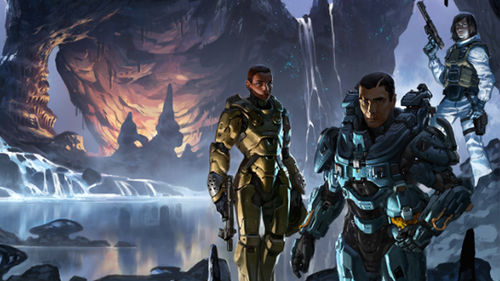
Speaking of action that jumps off the pages, we continue our bountiful Halo harvest this year with the fourth literary release of 2015, Troy Denning’s Halo: Last Light, which drops officially this coming September 15th. It’s a must read for fans of Spartans, especially Blue Team, as the combination of excellent characterization and detective-style narrative blend together to create a piece quite unlike any other in the Halo fiction so far. Well known fiction-focused community member Toa Freak from the Halo Canon YouTube channel says Halo: Last Light is "A murder-mystery set in the Halo Universe that perfectly captures the turmoil following the Covenant War, and does extremely well by beloved characters." The folks at that same community channel also have a great series of Blue Team primer videos to help get you ready for Halo 5: Guardians that you should definitely give a look. And since we are on the subject of Halo: Last Light, you might as well start with their take on Spartan-II Fred-104, a fan-favorite Spartan that features prominently both in the new novel, and the upcoming game.
You can experience Halo: Last Light for yourself next week, which if nothing else, will help further ease the wait between now and the release of Halo 5: Guardians this October. If you are looking for a chance to get a very special copy of your own, I'd advise you to keep an eye out for Bravo's Community Update later today, as we might just be giving away copies of the new novel signed by author Troy Denning. And by "might" I mean "we are." And of course, once the book has been out in the wild for a bit, we’ll be doing our customary deeper dive into its pages right here in Canon Fodder, so stay tuned!
Joining the fleet Elite[modifier le wikicode]
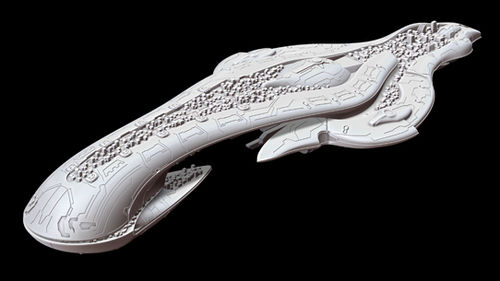
In case you missed it, not long ago our friends and partners at Spartan Games headed to THE event for tabletop gaming in the United States, GenCon 2015 in Indianapolis. If you were one of the lucky fans in attendance, you might have gotten a glimpse of some of the prototype units for the upcoming Halo ground game, as well as for further additions to Halo: Fleet Battles. If you weren’t able to make it, then have no fear, as we’ve got you covered right here. 343 Industries’ own Kenneth Peters was also at GenCon to support Spartan Games and explain the lore behind the game to fans. Today he has his own field report from the GenCon trenches.
Setting the tabletop[modifier le wikicode]
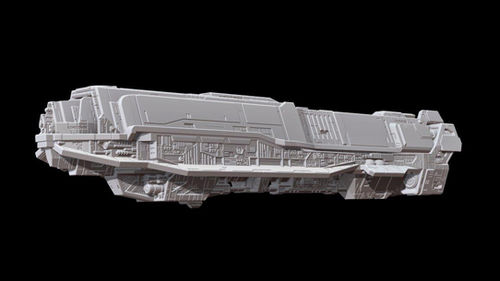
- “I expected GenCon 2015 to be busy, but over 61,000 gamers was a sight to see! In addition to helping Spartan Games plan the next wave of Halo: Fleet Battles I had the opportunity to talk Halo with all manner of fans regarding everything from canon minutia to game mechanics. We’re very happy with the response to Halo: Fleet Battles (it completely sold out), but more is yet to come! With the usual caveats that plans can change and some models are not yet final, here’s an update on the tabletop games set in the Halo Universe!”
Fleet actions[modifier le wikicode]
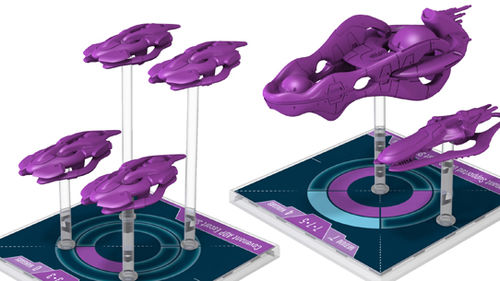
- “The centerpiece for Halo: Fleet Battles at GenCon 2015 was definitely the scale model of Rho ‘Barutamee’s flagship, the Long Night of Solace. Yes, scale model. Meaning that the vessel was over four feet long! You could fit the entire Covenant fleet from the starter box in its cavernous hangar bay! The Solace’s imposing presence at the demo table drew impressive crowds of onlookers and more than one offer to buy the model outright. In addition to running demos and showing off the Long Night of Solace, Spartan Games had previews of upcoming miniatures on display for gamers and collectors looking to expand their existing Halo: Fleet Battles force."
- Two massive ships – the Covenant CAS Assault Carrier and the UNSC Punic-class supercarrier designs (both shown above) have been approved and will soon move into full-scale production. These can represent the legendary Shadow of Intent and Trafalgar, respectively, or flagships of your own. The Punic-class can actually mount frigates or destroyer models in its ventral sub-vessel bays! The CAS needs no introduction, though further improvements have been made to the prototypes seen in the rulebook and at GenCon. The CAS and Punic-class will be made in extremely high-detail, toy-safe resin. Each CAS and Punic will also include supporting vessels and new formations!
- New warships in the form of the Valiant-class superheavy cruiser and Halcyon-class cruiser will soon arrive to reinforce beleaguered UNSC fleets. The UNSC Everest – Admiral Preston Cole’s flagship in the early years of the Human-Covenant War – is the most well-known Valiant, but they were lynchpins of every fleet lucky enough to have one available. The Halcyon-class needs no introduction, though it was a heavily upgraded example of this class – the legendary Pillar of Autumn – that holds a special place in every Halo fans’ heart. Both the standard and refit versions of the Halcyon will be described, with the latter being particularly interesting for ahistorical fleet simulation enthusiasts.
- The UNSC and Covenant both get new support ships. The UNSC will soon be able to field iconic Halberd-class destroyers while the Covenant armada is bolstered by ADP escorts (a vessel more common in the Covenant’s core regions than crusading fleets) and the DSC support ship (of which the Infinite Succor is perhaps the most well-known example). Both of these new Covenant ships can be seen in the image just above. Both Halberds and the ADP will augment existing fleet vessels through the simple addition of new overlay cards.
- Defending Reach are Magnetic Accelerator Cannon platforms of unsurpassed lethality. These devastating orbital defense platforms will add a new element to the game in the form of fixed fortifications that form defensive hardpoints behind which you can rally your fleet. A cool feature of these models is that they can be mounted both horizontally and vertically!
- Several of these models will be available by the end of the year!
[modifier le wikicode]
- “Future fleets and warships were discussed at length during GenCon meetings. We will – of course - be seeing the Infinity in UNSC fleets, but that will be releasing with a wave of post-War craft seen in Halo 4 and Halo 5: Guardians – including the svelte Sangheili Man O’ War and heavily-armed Strident-class frigates! These will alter the balance of power within the fleets as the delta in technology between the Covenant and UNSC becomes smaller, but will also open new opportunities to play out critical battles between the resurgent Covenant and the Arbiter’s Swords of Sanghelios!”
Darkened stars[modifier le wikicode]
- “Whether the parasitical Flood would appear in Halo: Fleet Battles was a very common question (#2 after inquiries regarding release schedule), and the answer to that is: only if we can do them right. Making Flood simply the “boarding party faction” isn’t terribly interesting and doesn’t do them justice. After a lot of brainstorming with the Spartan Games crew we hit on a set of mechanics that can make them both thematically interesting and fictionally consistent, but it will take a lot of playtesting to ensure balance and fun. Flood-specific ship models are not planned at this time, but I would not discount the talented folks at Spartan Games creating something super-cool. The faction will use existing ships in new and unique ways, with special overlays and game mechanics that reflect their hive-mind and puppeteering abilities. Resin add-on "infestation kits" to show Flood growths are also possible.”
Masters & Commanders[modifier le wikicode]
- “I can’t wait to see the new ships hit the table, but we also have new Fleet Commanders and Heroes waiting in the wings! With beautiful art created by the extraordinarily talented David Heidhoff here at 343 Industries and cool game mechanics by Spartan Games that meld fiction with intriguing tactical options, we are sure these will be seeing a lot of play alongside the always-reliable Vice Admiral Stanforth and Supreme Commander ‘Barutamee from the core game.”
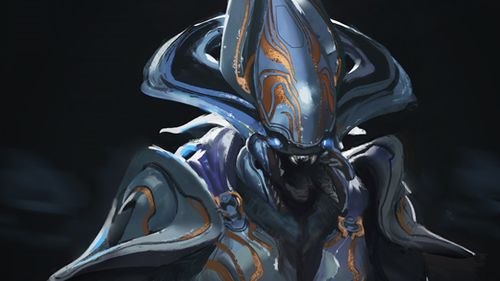
- Xytan 'Jar Wattinree: Though he would meet an untimely end during the Great Schism, Xytan’s genius for war and his surviving battle recordings continue to instruct new generations of Sangheili Shipmasters serving with both Jul ‘Mdama’s Covenant and the Arbiter’s Swords of Sanghelios. While Xytan was not present at the Fall of Reach itself, his brilliance combined with the audacity of Supreme Commander Thel ‘Vadamee would have made for a devastating combination during that battle.”
- Gameplay: Design intent for this cunning Covenant commander was to represent a dagger-like tactical genius. In Halo: Fleet Battles we modelled his unique command style with orders that allow him to automatically seize initiative at key junctures of the battle and constantly throw his enemies plans into disarray.
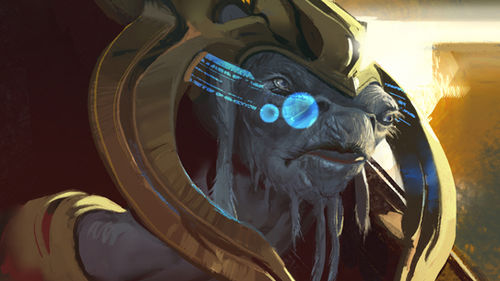
Ministry of Etiology: Assigned to Thel ‘Vadamee’s Fleet of Particular Justice as master of the support ship Infinite Succor, this ambitious Legate would eventually meet his end fighting the very threat he had spent much of his life studying – the Flood.
Gameplay: This was a fun card to help design! In addition to adding dice to the Fleet Commander’s command pool, the Minister can pull rank to adjust results to his (no doubt selfish) goals and ensure that he’s alive to reap the benefits by ordering Shipmasters to maneuver into enemy attacks meant for him! That’s important because unlike Fleet Commanders, who are represented as an off-board presence, the Minister of Etiology is a Heroic Character who must be assigned to a specific ship in a fleet!
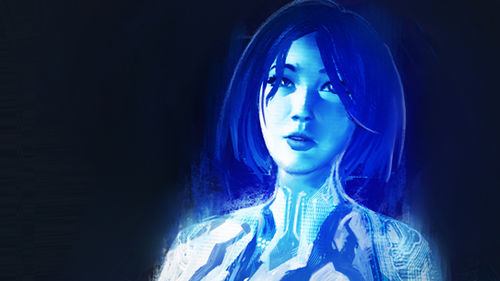
- Cortana: For Operation: RED FLAG, Cortana selected the Master Chief as her Spartan partner, based on his combination of luck and talent. The combination of John-117, Cortana, and Mjolnir power armor proved to be a hyper-lethal success, but her ability to handle the complexities of starship combat was also second to none.
- Gameplay: How could we not get Cortana into the battle for Reach’s fate? This Cortana (as with all Commanders and Heroes there may be alternate versions) is a battlenet specialist, significantly augmenting the tactical flexibility of the Fleet Commander she is assigned to and able to hack enemy Battle Groups to reduce their firepower. Though Cortana must be assigned to a specific ship, she is able to augment her allies and hinder foes across the naval engagement.
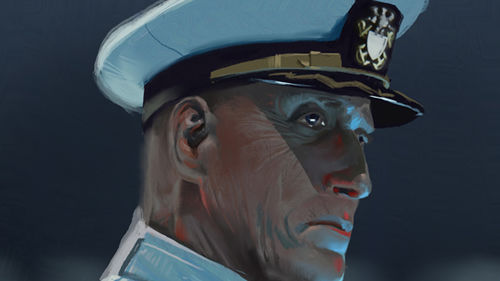
Lord Hood: It was Hood’s indefatigable leadership during the Covenant War that allowed the Navy to survive as a fighting force against impossible odds, and every captain who survived can tell a story of the Fleet Admiral appearing at crucial moments to inspire the forces or make seemingly prescient strategic adjustments on which the fate of entire campaigns hinged.
Gameplay: As befits his responsibilities and role, Fleet Admiral Hood has abilities that augment overall fleet efficiency. From a fiction perspective it was crucial that he felt ‘detached’ from the fate of individual ships as a function of being responsible for the UNSC Navy as a whole; his actions in Halo: Fleet Battle represent carefully-calculated plans and measured attention to detail rather than micro-managing ship captains or even being directly aware of events at the relatively small scale of a fleet skirmish.
Ground Beefy[modifier le wikicode]
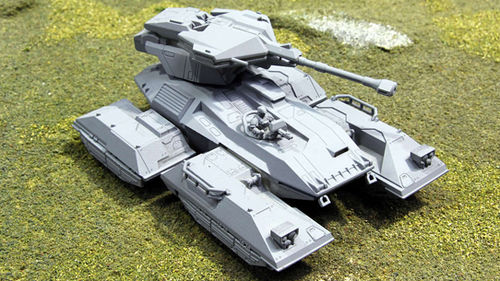
- “We made significant progress on the ground game development during meetings at GenCon, both in terms of nitty-gritty production requirements (plastic sprue layout, fiction wordcount, initial release units) and design philosophy (game mechanic complexity, force organization, etc.). We announced Halo Wars 2 shortly after the convention, so this obviously factored into certain planning details! We’re going to be holding some cards about this game a bit close to our chest for right now, but we can reveal some interesting details:”
- We are not ready to reveal the final name for the product. We can confirm it won’t be Halo: Ground Game.
- Scale is 1/100 (c. 15mm). Halo: Fleet Battles is 1/20000 scale as a point of comparison!
- Basic game mechanics (e.g. the dice system) are similar to Halo: Fleet Battles, though troop morale plays a key role. Where appropriate we are using the same terminology across both games.
- Design intent is to allow players to field platoons of infantry supported by up to a dozen vehicles and have a game play out in a reasonable span of time (about 90 minutes, although players can easily expand their forces to play all day!).
- The actual mechanical parts of the game is focused at the squad level. You will not be rolling for individual “sticks” with plasma grenades. However, we are looking at concessions for “rule of cool” Halo elements, like Warthog splatters and vehicle hijacking.
- Infantry have multiple models on a single base, representing fireteams for the UNSC and lances (or demi-lances) for the Covenant. Line troops are on larger bases, command elements and specialists on smaller bases, so you can easily pick them out on the tabletop. The base unit of maneuver is the squad or file, which consists of line and specialist bases in various combinations. The sprue design we’ve worked out should give considerable flexibility in force composition right out of the box (even more if you want to magnetize some key units).
- Dropships are a core part of the game, though not a central element of maneuver and strategy. Whilst the current plan isn’t to include a *Pelican or Phantom model in the starter box, we do intend to include a full size template (top view on one side, wrecked on the other) for a UNSC and Covenant dropship so you can make use of them even before Spartan Games releases the models themselves. And dropships are not going to be the largest units in the game...
- Drop pods will be key to both Covenant and UNSC victory! Meteoric assaults by UNSC ODSTs and Elite SpecOps are vital in getting firepower in the right place, at precisely the right time. Using drop pods as impromptu orbital artillery may not make the final cut.
- We heard the call for crossover rules with Halo: Fleet Battles loud and clear, both with regard to playing out boarding actions in a ground game ‘sideboard’ and simulating orbital assaults. Using both games at once will be optional, due to the extra complexity and time involved.
- Interesting and unique factions are part and parcel of Halo, and you will be seeing more than just the Covenant and UNSC in the future...
There’s always next year[modifier le wikicode]
- “Thanks to amazing retail partners and a dedicated group of the Spartan Vanguard volunteers many lessons were learned during Spartan Games first foray into the colonies. Already Spartan Games aims to be back - bigger and better - for GenCon 2016 to show off the ground game and the latest warships for Halo: Fleet Battles. As part of the planning for next year we kicked around ideas for demo table designs I thought were impossibly ambitious, but Spartan Games assures me are doable. If you thought a scale Long Night of Solace for terrain was impressive, wait until you see what they bring out next August 4 – 7 in Indianapolis!”
Phew! A thousand thanks to Kenneth and the folks from Spartan Games for the fantastic update. If you want more details on how to get your hands on the latest and greatest additions to the Fleet Battles family, check out Spartan Games’ September 2015 update. And with that, we draw to a close for this edition. If you’re hunting for details on other upcoming Halo fiction, you’ll probably want to turn in next week, just saying. And in the meantime… Go read Halo: Last Light!
Until next week, Live well, play Halo, and don’t shake the lightbulb.
-Grim
New universe entries this week![modifier le wikicode]
Iona was a smart artificial intelligence created specifically for operational analysis by ONI.
Black-Box is a fourth-generation AI construct used to monitor affairs at the highest levels of human government for Serin Osman, head of ONI.